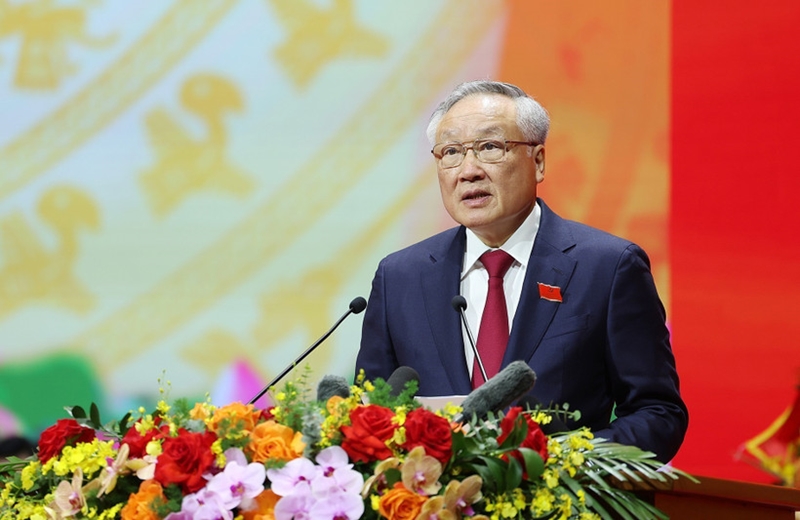The draft report highlighted comprehensive reforms in Party building and rectification on political, ideological, and ethical fronts.
The Government Party Committee has spearheaded and overseen the fulfillment of socio-economic development goals and tasks for the 2021-2025 period, with annual results outpacing those of the prior year. Out of 26 targets, 24 were met or surpassed, notably with all social indicators fully realized, it said.
    |
 |
|
Politburo member, Permanent Vice Secretary of the Government’s Party Committee, and Standing Deputy Prime Minister Nguyen Hoa Binh presents the draft political report. |
Vietnam's gross domestic product (GDP) grew from 346 billion USD in 2020 when it ranked 37th globally to over 510 billion USD by 2025, jumping five spots to 32nd worldwide and fourth in ASEAN. Per-capita GDP increased 1.4 times, rising from 3,552 USD to more than 5,000 USD, propelling the country into the upper-middle-income category.
Infrastructure has been a key focus, particularly in expressways, airports, seaports, urban railways, and digital networks. A range of delayed projects and loss-making enterprises have been decisively addressed, including five weak credit institutions and 12 inefficient projects spanning multiple terms. Local authorities have received guidance to clear obstacles, enabling 1,154 projects and properties valued at around 675 trillion VND (25.6 billion USD) to resume operations and attract further investment. Close to 3,000 additional projects, involving quadrillions of Vietnamese dong in capital and hundreds of thousands of hectares in land use, are under evaluation for classification and settlement by relevant authorities.
The rate of trained workers climbed from 64.5% in 2020 to 70% in 2025. Sci-tech, innovation, and digital transformation have garnered heightened focus, including the setup of a national data center and the deployment of population, identification, and electronic authentication systems, establishing a vital base for digital government, economy, and society.
Living conditions have steadily advanced, with more than 334,000 temporary and dilapidated homes eradicated five years and four months ahead of plan. During the term, 1.1 quadrillion VND, representing about 17% of total state budget outlays, was directed toward social welfare.
National defense - security has been reinforced, ensuring social safety and order and safeguarding national independence, sovereignty, and territorial integrity. External affairs and global integration have been elevated, especially in economic diplomacy, thereby enhancing Vietnam’s global reputation and standing.
For the 2025-2030 term, the Government Party Committee will prioritize building a clean and robust Party organization, cultivating a contingent of officials marked by strong political resolve, integrity, competence, and reputation to handle assigned tasks. The committee will intensify targeted inspections and oversight, while fostering a Government that is clean, action-oriented, self-reliant, confident, and development-driven, determined to make breakthroughs and achieve the nation’s development goals.
The overall goal is to maintain a peaceful and stable environment while ensuring rapid and sustainable economic development. By 2030, Vietnam targets becoming a developing country with a modern industrial foundation and upper-middle-income status, ranking among the world's top 30 economies and third in ASEAN. Economic expansion for 2026-2030 is projected to stay elevated, with macroeconomic stability preserved
Key socio-economic targets include an average annual GDP growth rate of 10% or more, and raising GDP per capita to about 8,500 USD by 2030.
On Party building, the committee will rigorously follow the Party’s resolutions to achieve a Party membership growth rate of at least 3%, with 20% of Party organizations annually rated as excellently fulfilling tasks, and at least 90% of Party members assessed as performing well or better.
The draft further details primary tasks and solutions for Party building, alongside guidance for socio-economic progress, national defense-security, and external affairs.
The Government Party Committee set out seven key tasks and breakthroughs, stressing comprehensive and effective measures to advance three strategic priorities, namely institutional reform, modern economic infrastructure, and workforce quality.
The committee will target completing 5,000km of expressways nationwide by 2030, finalizing the full coastal road system, concluding the Lao Cai-Hanoi-Hai Phong railway, and building 100km of urban railways in both Hanoi and Ho Chi Minh City. By 2030, the digital economy is slated to constitute at least 30% of GDP.
The state economic sector will maintain its guiding role in the economy, while the private sector is seen as a primary engine of growth. Foreign-invested projects will be selectively drawn in, with a focus on technology transfers. The committee will oversee the removal of longstanding hurdles in delayed projects, thus unlocking resources for economic use.
Moreover, efforts will be expedited to establish the international financial center in Ho Chi Minh City and Da Nang, along with next-generation free trade zones in promising localities.
Source: VNA